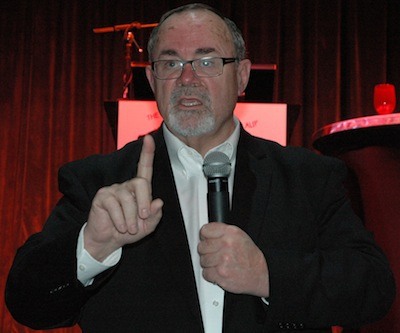TULALIP — Gary Chandler, vice president of government affairs for the Association of Washington Business, returned to the Greater Marysville Tulalip Chamber of Commerce’s Business Before Hours on Friday, Feb. 28, to predict that the current state legislative session would wrap up quickly, due to a number of factors which caused him to express cautious optimism, even as he echoed incoming AWB President and CEO Kris Johnson’s call for local business owners to share their stories with legislators.
“I can guarantee this session will conclude by March 13, and I wouldn’t be surprised if it wrapped up by March 11,” Chandler said. “It’s an election year, so most of their focus is on making the other side look bad, and for the first time in six or seven years, the forecast is up, but not by a lot, which is actually a good thing, because it if was up by a lot, everyone would want to spend more money.”
While Chandler deemed both the House and Senate budgets fairly bipartisan and relatively close to each other, he anticipated that one point of contention could be a Senate Democratic proposal to take away certain tax incentives for businesses, which he fears could have a disproportionate impact on smaller local businesses.
“Folks who buy from our businesses across state lines don’t currently pay state sales taxes, but if they had to, even if those costs could be redeemed, would our businesses lose business?” Chandler asked. “If not for the tax rate that Boeing currently enjoys, would it still be here?”
Chandler seconded Johnson’s assertion that investment in transportation infrastructure is vital to the entire state, and while a number of problems in the Department of Transportation’s projects have been well-publicized, Chandler nonetheless praised the reforms that have been made to the DoT.
“Most of its projects are on time and on budget, and some are even under,” Chandler said. “The DoT has more mega-projects going on now than ever before, and while I don’t like paying more at the pump in gas taxes any more than any of you, the question becomes, if not today, then when? That third ferry needs to be built, and we can do it for a reduced price now, but if we wait, that price is going to go right back up.”
By contrast, Chandler disagreed with legislators’ proposals to raise the minimum wage, reiterating his call for smaller businesses to explain to their legislators how such a move would affect their business.
“Most minimum wage jobs are unskilled labor and first jobs,” Chandler said. “As a small business owner myself, I can say that raising the minimum wage would result in employees’ hours being cut, and probably somebody losing their job. It’s a direct attack on those who are trying to give young people their first jobs. Flipping hamburgers at McDonald’s is not a career path, and if you have non-entry-level employees who are stuck in those jobs, how about we get them the education and training to get out of that?”
To meet these workers’ career needs, Chandler cited CTE and STEM as being at least as important as four-year colleges and universities.
“The right trades can provide great family-wage jobs,” Chandler said.
After Chandler warned that raising the minimum wage could cost Washington jobs to surrounding states, he decried what he saw as the foolishness of the legislature’s fiscal note process, which considers potential revenues without also taking into account possible losses.
“It only looks at how much money could be made through taxes,” Chandler said. “If a business were established, and it didn’t generate a certain amount of tax revenue, that money would be considered ‘lost,’ even though it’s money that the state never had in the first place. It doesn’t look at the business that would be lost by people choosing not to buy here anymore.”
Even as Chandler reluctantly repeated his insistence that the gas tax must go up yet again to support transportation projects, due in part to increased fuel efficiency in automobiles, he also wondered why non-emergency transportation projects can’t be permitted as quickly as the replacement of the collapsed I-5 Skagit River Bridge was.
Chandler closed his remarks with a final warning against raising the minimum wage, claiming that it would limit the ability of nonprofit groups to hire disabled employees.



